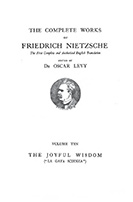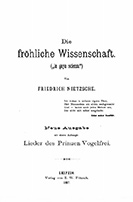The Complete Works of Fredrich Nietzsche: The Joyful Wisdom
“Some new pieces of music encumbered the music-stand in the lower room and on his shelves stood two volumes by Nietzche: Thus Spake Zarathustra and The Gay Science.”
-“A Painful Case” (D 112)
After Mr. Duffy breaks off his relationship with Mrs. Sinico in “A Painful Case,” a couple of new books appear on his shelves. Nietzsche’s The Gay Science enters his orderly library. This first complete English translation of Nietzsche’s Die fröhliche Wissenschaft: la gaya Scienza (1882) did not appear until 1910, five years after the composition of “A Painful Case,” and its translator Thomas Common entitled it The Joyful Wisdom. Joyce’s Trieste library contained a copy of this book published by T.N. Fouls, along with a number of other texts from the The Complete Works of Friedrich Nietzsche (JJTL 352). However, if Joyce read the work at the time he was writing Dubliners, he would have most likely come in contact with either the German or French editions, published in 1887 and 1901 respectively.
As an unbeliever and freethinker, Duffy would have been drawn to Nietzsche’s critique of the Christian ethic and the existence of God. Nevertheless, The Joyful Wisdom sits ironically on Duffy’s shelf because of the exuberance, humor, and joy that it preaches. In the preface to the second edition of the work, Nietzsche reveals the prevailing tone of the work, writing, “[t]he whole book is really nothing but a revel after long privation and impotence: the frolicking of returning energy, of newly awakened belief in a to-morrow and after-to-morrow of sudden sentience and prescience of a future, of near adventures, of seas open once more, and aims once more permitted and believed in” (2). The optimism for the future and sense of overcoming a sorrowful past that characterizes the poetry and philosophical passages in the book are denied to James Duffy at the end of “A Painful Case.” As he walks through the Phoenix Park after learning about the death of Mrs. Sinico, he feels “he was outcast from life’s feast” (D 117). Yet the presence of the Gay Science on his shelf might offer the reader some way out of the despair and loneliness that accompanies the silence of the story’s final scene on Magazine Hill, as Nietzsche celebrates the power of forgetting (14) and a spiritual deepness that is won through pain (7).


